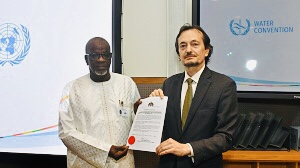
The Gambia has joined the Convention on the Protection and Use of Transboundary Watercourses and International Lakes known as the UN Water Convention.
It became the 9th country in Africa and the 52nd in the world to join the UN body.
The Gambia’s accession comes within weeks of Namibia and Panama’s accessions, demonstrating the growing global momentum for cross-border water cooperation, supported by the Water Convention.
At a ceremony held during the SDG 6 and the Water Action Agenda Special Event of the High Level Political Forum on Sustainable Development in New York on 17 July 2023, The Gambia’s Minister of Fisheries, Water Resources and National Assembly Matters, Musa Drammeh stated that “The Gambia has forged and pioneered regional water cooperation through the 1978 Convention, establishing the river Gambia Basin Organization (OMVG)”.
He recalled that since February 2019, the Water Convention Secretariat with other technical and financial partners have supported the dialogue on the concerted management of the Senegalo-Mauritanian Aquifer Basin (SMAB), leading to the development of a Joint-Regional Project and a Ministerial Declaration in September 2021.
“Hence, being part of these two basins, our accession to the two UN Water Conventions, would strengthen our capacity to effectively participate in transboundary water cooperation through the support of the Water Convention to enhance Integrated Water Resources Management at national level”.
For the Gambia, membership will make a significant contribution to the more dependable management of its water resources, jointly with its neighbouring states.
The Gambia is a downstream country along the Senegal River, which shares all its land borders with Convention Party Senegal.
It also shares the river Gambia and the Senegalo-Mauritanian Aquifer, for which the Convention is already supporting cooperation, with Senegal and Guinea Bissau.
The river Gambia basin covers over 90% of The Gambia’s land surface while accounting for 13% of the basin area. The Gambia has a water dependency index of 60%, as most of its total renewable water resources flow from other riparian countries, mainly from Senegal and Guinea.










Recent Comments